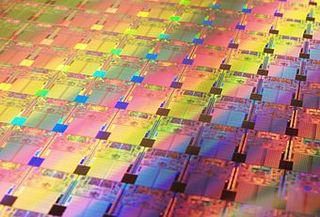Low-energy chip cuts power use by 90 per cent
Processor concept is also seen as a first step towards super low voltage chips powered by the human body itself, and could be with us in five years.

Ever wished your phone would never run out of battery power? That dream may be one step closer to reality today thanks to a new chip unveiled by researchers as MIT, at the International Solid State Circuits Conference in San Francisco.
The proof-of-concept, designed in conjunction with Texas Instruments, promises to reduce power consumption by as much as 90 per cent compared to today's chips and could find its way into mobile computing hardware such as BlackBerrys and similar devices in around five years time.
Voltage is key to the chip's energy efficiency credentials. While most of today's chips operate at around one volt, this design drops this down to 0.3 volts, smashing through the barrier at which chips can be made to operate. However, inevitably the voltage required by a chip depends on what that device, such as a smartphone, might be doing. While 0.3 volts is enough when the chip is idle, the voltage will go up as load in the chip increases. The trick is to make it scale, quickly and efficiently, between higher and lower voltages.
"The concept we have calls for dynamic voltage scaling," said Dennis Buss, chief scientist at Texas Instruments. "The voltage can be increased or decreased depending on how much computation you have to do. When you need to go fast, you turn up the voltage. When you have a sleep mode or standby, then you can drop the voltage and save substantial power."
The voltage required may eventually be so low, that the human body itself could be used as a source of power, a process that Buss refers to as 'scavenging'. This could lead to chips that could be placed directly in medical devices such as heart monitors and powered simply by body heat. "It's possible", says Buss, "but it's not in production today. It's a research topic still."
Get the ITPro. daily newsletter
Receive our latest news, industry updates, featured resources and more. Sign up today to receive our FREE report on AI cyber crime & security - newly updated for 2024.
Benny Har-Even is a twenty-year stalwart of technology journalism who is passionate about all areas of the industry, but telecoms and mobile and home entertainment are among his chief interests. He has written for many of the leading tech publications in the UK, such as PC Pro and Wired, and previously held the position of technology editor at ITPro before regularly contributing as a freelancer.
Known affectionately as a ‘geek’ to his friends, his passion has seen him land opportunities to speak about technology on BBC television broadcasts, as well as a number of speaking engagements at industry events.
Most Popular






